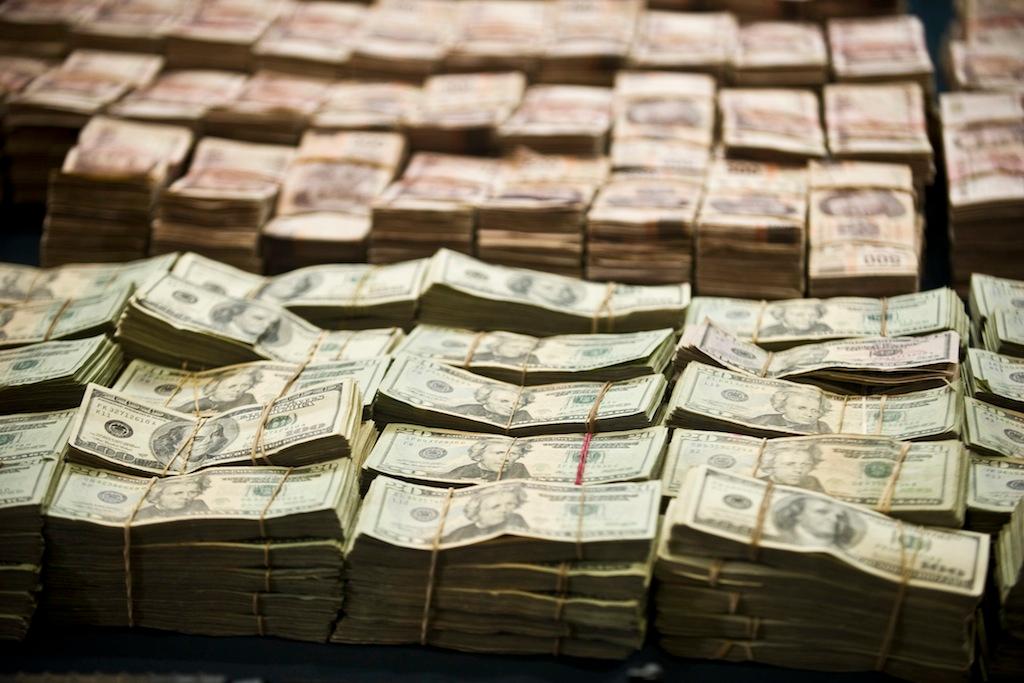Too big to fail: HSBC and the crimes of the cartels
Seized cash like the dollars and Mexican pesos pictured here is nothing compared to the multi-billion dollar empire of the Sinaloa cartel, which laundered its money through HSBC. The US has decided not to prosecute the bank, despite its business with drug cartels and other criminal operations.
Joaquín "El Chapo" Guzman is Mexico's most wanted criminal, the leader of the Sinaloa cartel, and one of history's most violent figures. In the three decades he's been active, Guzman has allegedly controlled supply and smuggling routes from Colombia to Chicago and all the way to Spain, all while maintaining his position as the head of an operation that's been responsible for an incredible amount of carnage.
The Sinaloa profit margins are in the billions annually, according to a number of sources, and the cartel has been identified as one of the illegal operations accused of laundering money through international mega-bank HSBC, which has escaped prosecution due to its status as one of the world's largest financial institutions.
US attorneys say prosecuting the bank would result in a global financial meltdown, and HSBC has agreed to pay $1.92 billion, a paltry amount that is not worth even half a quarter's earnings, considering what the bank has been accused of by the Senate Permanent Subcommittee on Investigations and the Department of Justice.
In the committee's report, Senator Carl Levin accused the bank of knowingly participating in money laundering and failing to adequately police international banking operations.
Last week, federal prosecutors stated, "The bank 'ignored the money laundering risks associated with doing business with certain Mexican customers and failed to implement' an anti-money laundering program 'that was adequate to monitor suspicious transactions from Mexico' from 2006 through 2010," according to a report by CBS.
More from GlobalPost: US, HSBC reach $1.92 billion settlement
By doing business with the cartels and allegedly laundering their money by way of Colombian pesos bought on the Black Market Peso Exchange, a process through which narcotics cash can be converted and then invested, HSBC has tied itself to the crimes of the cartels.
Over 50,000 lives have been lost in drug-related violence tied to the cartels, including Sinaloa, which allegedly laundered money through HSBC. Beheadings and brutal murders are side effects of the drug war, and the cost of business as usual includes the violence between the Sinaloa cartel and the Zetas, a newer, more ruthless kind of cartel that also has its hands in human trafficking and extortion.
The turf war between Guzman and the Zetas has ravaged a significant portion of Mexico, and authorities tied the murder and dismemberment of four journalists in Veracruz to the Sinaloa cartel in May of this year. Veracruz, a Zeta stronghold, also saw the rise of a sub-group.
"Sinaloa operatives may be behind a group called the Mata-Zetas ("Zeta-killers") who signaled their debut by dumping 35 mangled bodies into the center of Veracruz city last summer," reported the Los Angeles Times.
The administration of former President Felipe Calderon, whose term ended at the end of November, has been continuously accused of playing favorites with the Sinaloa cartel, opting to let them continue warring with the Zetas. Not to mention, a notorious amount of corruption on the local level, where everyone from municipal bureaucrats and police to American DEA agents and border guards have been accused of accepting bribes from Guzman's operatives.
More from GlobalPost: HSBC 'allowed drug money laundering', says US Senate
"The surest way to stay out of trouble in the drug business is to dole out bribes, and promiscuously. Drug cartels don’t pay corporate taxes, but a colossus like Sinaloa makes regular payments to the federal, state and municipal authorities that may well rival the effective tax rate in Mexico," wrote Patrick Keefe in a New York Times expose of how the cartels handle their money. "When the DEA conducted an internal survey of its top 50 operatives and informants several years ago and asked them to name the most important factor for running a drug business, they replied, overwhelmingly, corruption."
Because the Sinaloa cartel has traditionally been strictly business, more measured, more savvy, and less violent than the Zetas (who can only be considered sociopathic nutjobs), it's widely speculated that Mexico's last administration took their hands off Sinaloa in exchange for help fighting the other cartels.
That doesn't excuse the crimes of Sinaloa, however, it doesn't exonerate them, and it makes no bearing at all on their alleged ties to HSBC.
Besides the murders in Veracruz earlier this year, the Sinaloa cartel has been tied to kidnapping, femicide, and is guilty of smuggling a huge percentage of the drugs that cross the border and are then distributed across the country, resulting in the street and gang violence we see in the US. An in-depth 2011 DEA investigation dubbed Operation Imperial Emperor resulted in the arrests of hundreds of Sinaloa traffickers, smugglers and muscle, a case that was followed and reported in a multi-part LA Times series by Richard Marosi.
However, Guzman is still at large, and despite its size, the case had little effect on the larger scope of the Sinaloa cartel's international operations. The cartel has continued unabated, and so will HSBC.
